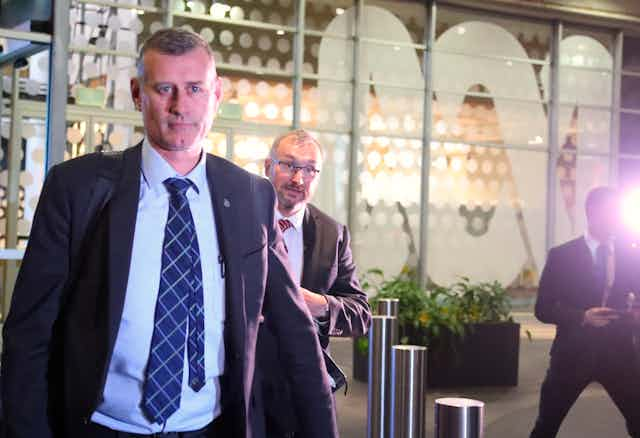Scott Morrison and Anthony Albanese will discuss on Wednesday the government’s plan for an inquiry into the impact of the exercise of law enforcement and intelligence powers on press freedom.
The government said on Tuesday it will have the powerful Parliamentary Joint Committee on Intelligence and Security undertake the inquiry.
But Labor argues this is not the best forum and says the issue should go to a new parliamentary joint committee.
In the Senate on Tuesday shadow home affairs minister Kristina Keneally gave notice of a motion to establish a new select committee. Her motion is due to be voted on this Thursday.
In practice, the opposition could not get parliamentary support for a joint select committee - the best it could achieve would be getting the numbers for a Senate committee, and that would mean two inquiries. But another option would be for the opposition to press for the terms of reference of the PJCIS inquiry to be widened.
The terms of reference of Keneally’s proposed inquiry into “the appropriate balance between the public’s right to know, the freedom of the press and Australia’s national security” overlap some of the government’s but are considerably wider.
They would, for example, deal with whistle blowers, who are not covered in the government’s inquiry. The Keneally committee would also have crossbench representation; the security committee has only government and opposition members.
Read more: Explainer: what are the media companies' challenges to the AFP raids about?
Press freedom suddenly became a big issue after Australian Federal Police raids recently on the home of a News Corp journalist and on the ABC. The police were pursuing separate leaks of classified information. The ABC and News Corp have legal actions underway.
Media organisations have banded together in calls for strengthened protections for journalists.
Labor received Morrison’s letter to Albanese about the inquiry after Keneally gave her notice of motion, although the government said cabinet made the decision on Monday.
The PJCIS operates in a bipartisan fashion, albeit with a government majority, and has been where much security legislation has been refined.
Morrison’s letter said: “The Government is committed to ensuring our democracy strikes the right balance between a free press and keeping Australians safe – two fundamental tenets of our democracy”. The government would consider proposals that aim to ensure that balance, he said.
Read more: Why the raids on Australian media present a clear threat to democracy
The government’s proposed terms of reference for the inquiry – reporting by October 17 - include looking at
… The experiences of media and media organisations that have, or could become, subject to the powers of law enforcement or intelligence agencies, and the impact of the exercise of those powers on journalists’ work, including informing the public;
… the reasons journalists and media organisations have, or could become, subject to those powers;
… whether any, and if so what, changes could be made to procedures and thresholds for exercising those powers to better balance the need for press freedom with the need for law enforcement and intelligence agencies to investigate serious offending and obtain intelligence on security threats.
Two issues are nominated for specific inquiry
..whether and in what circumstances there could be contested hearings on warrants authorising investigative action involving media; and
.. the appropriateness of current thresholds for law enforcement and intelligence agencies to access electronic data on devices used by media.
Morrison said in his letter the terms of reference would give the committee an opportunity “to hear from both journalists and media organisations about the experience of being subject to the exercise of law enforcement and intelligence powers, as well as from government officials and agencies as to the reasons why these powers are used”.
He said the security committee was “well placed to conduct this inquiry given its responsibility for, and experience in, handling issues concerning national security information and legislation”.
The Keneally committee’s proposed terms of reference would cover
…Disclosure and public reporting of sensitive and classified information, including the appropriate regime for warrants in relation to the media, and adequacy of existing legislation;
… whistle-blower and public sector protections;
.. referral practices of the government after leaks;
..appropriate culture, practice and leadership for government and senior public employees;
.. mechanisms to ensure the Australian Federal Police have sufficient independence in investigating politically sensitive matters.
Keneally said: “The events of the past month have raised the question – is a free press a right Australians can continue to rely on under the Morrison government?
"There is a culture of secrecy and perverting the public’s right to know that has been making its way through this government for too long, and it’s time to call it out.”

